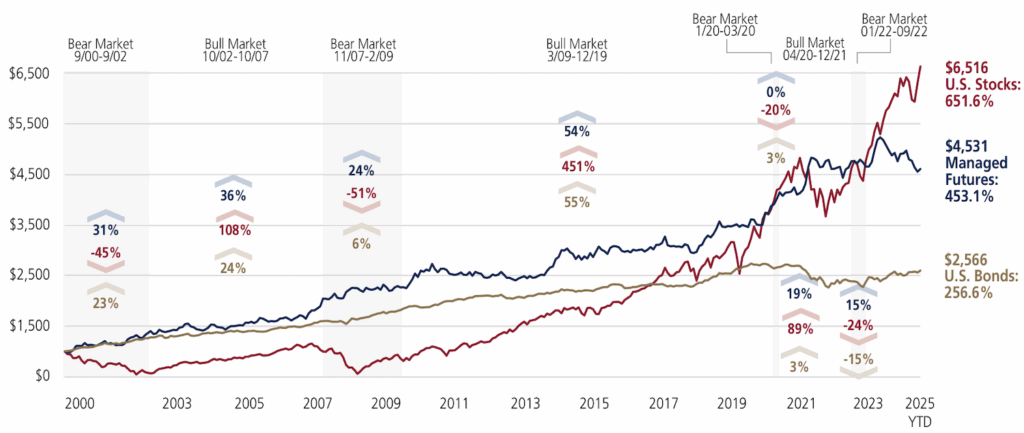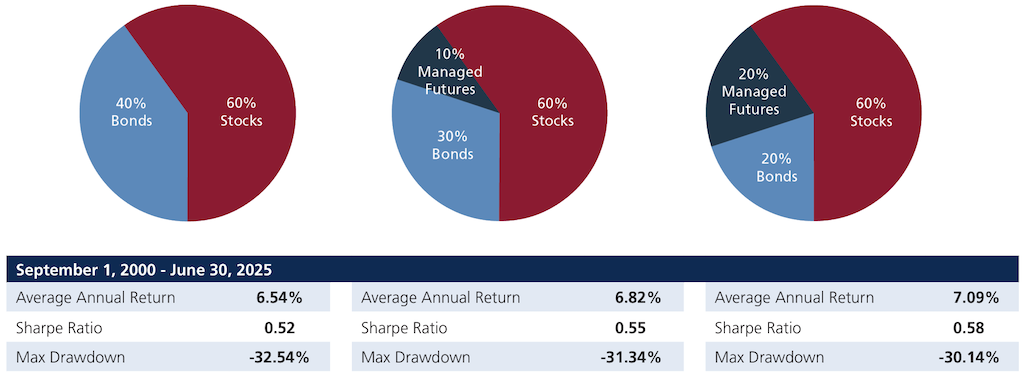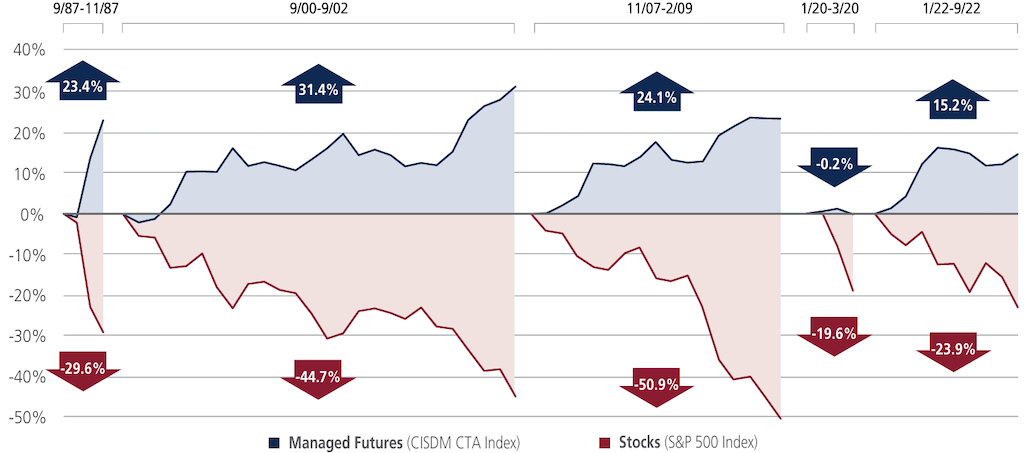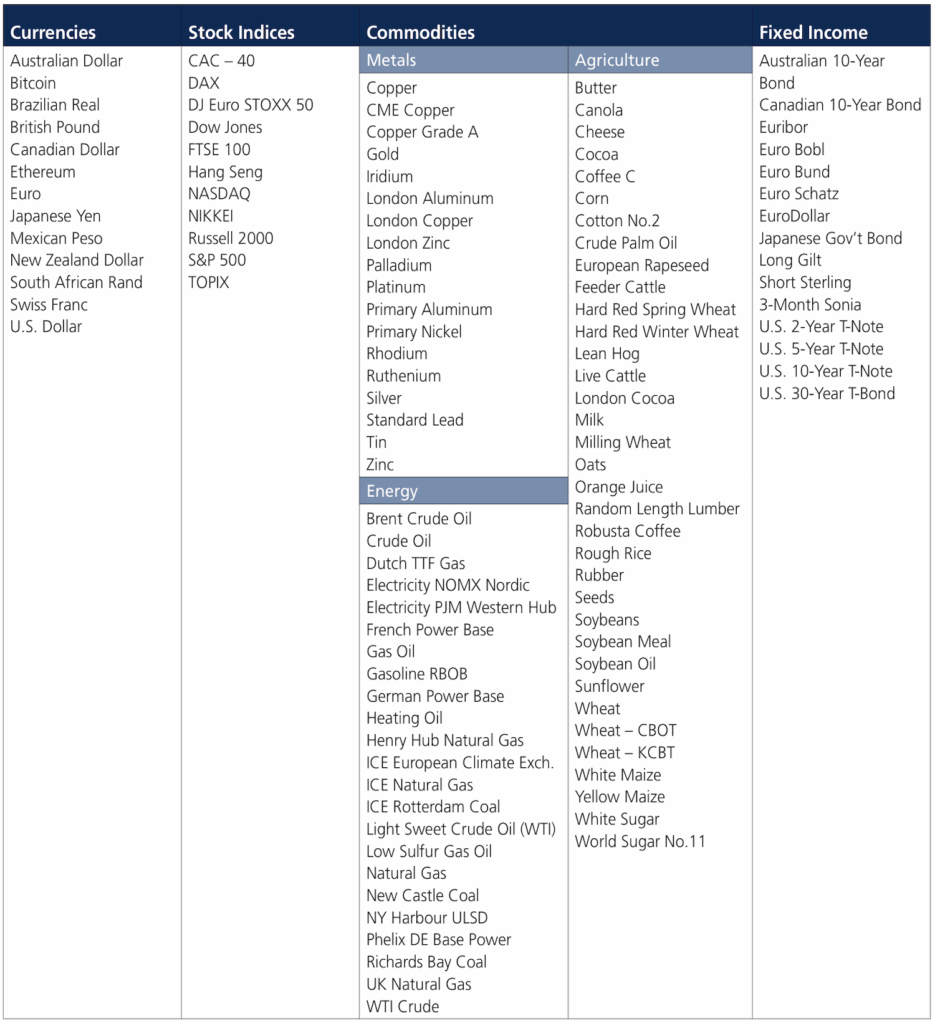- Why LoCorrA LEADER IN LOW-CORRELATION INVESTMENT SOLUTIONS FOR 20 YEARS
- Investment Solutions
- Insights & Education
- Literature

A managed futures strategy is a portfolio of actively traded futures contracts that takes long or short positions based on bullish or bearish signals. These strategies can take advantage of directional trends in many asset classes, including fixed income, currencies, equities and commodities. Managed futures strategies are known for their low correlation to traditional asset classes and therefore have the potential to provide diversification to portfolios.
Used by investment professionals for more than 30 years, managed futures are an asset class with over $350 billion in assets under management. Managed futures can play an important role by:
Historically, managed futures have produced positive returns in both bull and bear markets, outperforming bonds in five of the last seven market environments.
Growth of a Hypothetical $1,000 investment – September 1, 2000, through June 30, 2025

Past performance is not a guarantee of future results. Data based on cumulative returns. U.S. stocks are represented by S&P 500 TR Index, managed futures are represented by CISDM CTA Index, and bonds are represented by Bloomberg U.S. Aggregate Bond Index, using monthly data. Source: LoCorr Fund Management. The referenced indices are shown for general market comparisons and are not meant to represent the Fund. Fund performance may be obtained by calling 1.855.LCFUNDS (1.855.523.8637).
Managed futures provide exposure to a broad variety of global markets in commodities and financial futures. These hypothetical portfolios illustrate how an allocation to managed futures enhanced returns and diversified the portfolio.

Stocks are represented by S&P 500 TR Index, Bonds are represented by Bloomberg U.S. Aggregate Bond Index, Managed Futures are represented by CISDM CTA Index, and are shown for general market comparisons. They are not meant to represent a specific Fund. Source: LoCorr Fund Management.
Managed futures have historically shown strong performance when traditional investments have suffered. This graph illustrates the performance of managed futures during the five worst drawdowns of the S&P 500 Index since 1987.

The chart shows the significant S&P 500 drawdowns between 1/1/87 and 6/30/25 using monthly data. The CISDM CTA Index reflects fees and transaction costs. The S&P 500 Total Return Index does not reflect fees or transaction costs, but includes net dividends and is calculated by adding an indexed dividend return to the index price change for a given time period.
Source: LoCorr Fund Management.
| 1 Year | 5 Years | 10 Years | |
| S&P 500 Index | 15.16% | 16.64% | 13.65% |
| CISDM CTA Index | -9.24% | 5.87% | 4.97% |
| Bloomberg U.S. Aggregate Bond Index | 6.08% | -0.73% | 1.76% |
Managed futures have the ability to provide exposure to a broad range of global markets. This may include, but is not necessarily limited to, sectors such as currencies, stock indices, commodities, and fixed income. As you can see below, there are multiple markets within each asset class, providing the ability for more diversification as compared to traditional stock and bond portfolios.

The above list is a partial representation of possible market exposure.
Stocks, bonds, and futures are not guaranteed. Investments in equity securities involve risks such as volatility and the potential for loss of principal. Bonds traditionally experience less volatility than stocks and typically decrease in value when interest rates rise. Futures are derivatives which can be volatile and involve various types and degrees of risk, and depending upon the characteristics of a particular derivative, suddenly become illiquid. The use of futures involves risks different from, or possibly greater than, the risks associated with investing directly in securities and other traditional investments. These risks include (i) leverage risk (ii) risk of mispricing or improper valuation; and (iii) the risk that changes in the value of the futures contract may not correlate perfectly with the underlying asset. Investments in futures involve leverage, which means a small percentage of assets invested in futures can have a disproportionately large impact on an investment (or fund).
The performance of various indices is shown for comparison purposes only. The performance of those indices was obtained from published sources believed to be reliable but which are not warranted as to accuracy or completeness. Unless noted otherwise, index returns do not reflect fees or transaction costs and reflect reinvestment of net dividends.
One cannot invest directly in an index.
Click here for important disclosure and definition information.
Diversification does not assure a profit nor protect against loss in a declining market.
Mutual fund investing involves risk. Principal loss is possible. The Fund’s investment objectives, risks, charges and expenses must be considered carefully before investing. The prospectus contains this and other important information about the investment company, and it may be obtained by clicking here or a free-hard copy is available by calling 1.855.LCFUNDS. Read it carefully before investing. The Funds are offered only to United States residents, and information on this site is intended only for such persons. Nothing on this website should be considered a solicitation to buy or an offer to sell shares of the Funds in any jurisdiction where the offer or solicitation would be unlawful under the securities laws of such jurisdiction. The LoCorr Funds are distributed by Quasar Distributors, LLC.
If you have previously created a password protected account from LoCorr Funds, please sign in below to view gated materials.
Please enter your company email address. You will receive an email message with instructions on how to reset your password.
Send Recovery EmailThank you. A password reset email will be sent to you soon.